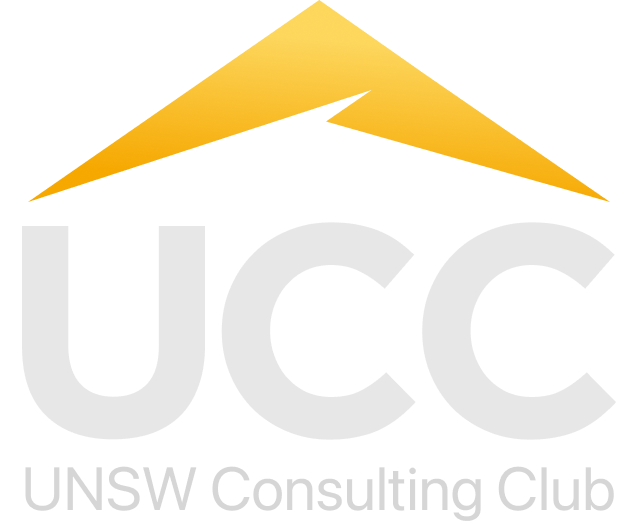So, what is TMT Consulting
Edition #4: Patrick Kwon
Welcome back to Coffee Connect! We hope you had a lovely Easter break and are feeling ready to tackle any last-minute assignments or late-night study sessions. As Term 1 winds down, this will be our final article before we pause for a short break, giving our writers some well-earned time to recharge. We'll be back in early Term 2 with more content, which will be as per our usual schedule!
This week, we sat down with Patrick Kwon and the team at Altman Solon to unpack the world of Technology, Media, and Telecommunications (TMT) Consulting. From industry shifts to strategic challenges and career advice, in this edition of Coffee Connect, we offer valuable insights into this dynamic sector.
A UNSW graduate majoring in Finance and Marketing, Patrick brings a diverse background with experience at leading firms, including Uber, American Express, and Jaguar, amongst others. Now, he is a Strategy Consultant at Altman Solon, the world's largest TMT Strategy Consultancy, with 15 offices across the globe. So, let's dive right in and learn what makes Altman Solon so successful.
Why Altman Solon sticks to its lane
“We do TMT - and nothing but,” Patrick says. “That means we’re able to go much deeper than most when it comes to strategy and transaction work.”
This focus keeps the firm at the cutting edge of all things digital. So, if 'consulting' conjures images of endless PowerPoint decks, think again. At Altman Solon, Patrick’s work spans from forecasting the impact of Generative AI on data centre infrastructure to analysing global consumer trends in sports streaming.
“We run our own primary research, interview industry experts, and build in-house models,” Patrick explains. “One team recently forecasted data centre demand by analysing levels of chip shipments. It’s that level of specificity that makes the work so interesting.”
And it’s not just about Gen AI. Whether it’s sustainability in TMT or digital transformation in media, Altman Solon stays ahead of the curve by building the tools that define it. And no, you don’t need to have memorised the 5G spectrum or be able to develop the next Facebook. What you do need is curiosity, clarity and hustle.
“Strong academics help, but we care more about how you think, how you communicate, and how you handle ambiguity”
A genuine interest in the TMT space and a willingness to learn fast are key. If you’ve ever kicked off a side project, cracked a tough case competition, or rebuilt a group assignment the night before it was due, those experiences matter. A few recommendations from the UCC team - read up on the AFR and S&P Globals TMT pages to get yourself that extra edge in the interviews.
The ideal candidate? Someone who thrives on connecting the dots, enjoys structured problem solving, and wants to build deep industry expertise, not just shuffle slides.
Group Assignments to Client Work
When asked what are some transferable skills he brought from university to his full-time role, Patrick distilled this into two insights:
Distilling Information into Key Takeaways: University projects and consulting society work teach you how to communicate the "so-what" - whether in discussion posts, reports, or slides. This can be one of the more difficult components of an analyst's role, and his university experience has provided him with a solid foundation.
Secondary Research & Data Analysis: Research-heavy assignments in marketing and finance helped Patrick navigate diverse sources, interpret data, and derive insights. A crucial lesson was applying an '80/20' approach to avoid spending a disproportionate amount of time in search of the perfect data point.
Now, for those unfamiliar with the 80/20 rule, it’s an effective heuristic to help prioritise time and effort. Also known as the Pareto Principle, it originates from economist Vilfredo Pareto’s observation that 80% of outcomes often stem from 20% of causes. In business and productivity, it’s a powerful tool for focusing effort where it matters most. For Patrick, this principle was key in research and analysis, recognising that chasing perfect data can be inefficient and that well-informed insights often come from identifying the most impactful inputs early. It’s a mindset that enables analysts to work smarter, not just harder. And it’s not only relevant in research - whether it’s wealth distribution or work efficiency, 80/20 is everywhere.
An overview of the 80/20 Rule, also known as the Pareto Principle
That said, many critical skills are developed through exposure to on-the-job best practices. While university offers valuable theory and context, real consulting experience equips you with a broad set of tools for both your personal and professional toolkit. For readers of our previous editions, where we explored how to convert an internship into a full-time role, you might recall the 70-20-10 rule: 70% of learning comes from hands-on experience, 20% from feedback and mentorship, and 10% from formal education.
Summary
Thriving in TMT consulting isn’t just about crunching data or memorising industry jargon - it’s about embracing curiosity, cutting through complexity, and crafting stories that drive decisions. As Patrick revealed, the firm’s edge lies in its razor-sharp focus on tech, media, and telecom, tackling challenges like predicting Gen AI’s ripple effects or decoding global streaming trends with tailored research and proprietary models.
The lesson? Mastery isn’t about knowing every answer - it’s about leaning into the unknown, learning relentlessly, and shaping the future, one bold move at a time.
This article was written by Alan Steny and Aryan Minocha, and edited by Rahul Pant. All experiences and opinions are their own unless otherwise specified, and do not represent the views of the UNSW Consulting Club or any affiliated organisations and sponsors.

